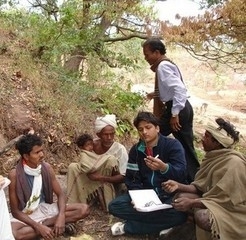 |
| Dr. Acharya among the Bhumkas of Patalkot (Given by Dr. Acharya) |
Here comes the information on an endangered forest in India and the gentleman who is trying to save it! This forest is significant for the reason that it is one of a kind in India and is preserved by its location at the bottom of a 3,000 foot cliff in a horseshoe-shaped valley, Patalkot. Here live Gonds and Bharia tribes. They light fires by flint, collect water from natural springs and dance all through the night remembering their gods and enjoying folklore. The whole valley is connected through a single road to the modern world; one can reach the center of the valley on foot only. Patalkot is home to a tribal culture skilled at using the forest plants to make effective medicines much sought after on the open market in India and internationally. The modern world has been completely unaware of its existence, until recently, and now there are increasing threats of deforestation and exploitation of the people. One man is synonymous with Patalkot and that is Dr. Deepak Acharya. Dr. Deepak Acharya has been trying to focus attention on this unique situation to help aid in the protection of the Patalkot forest and its people.
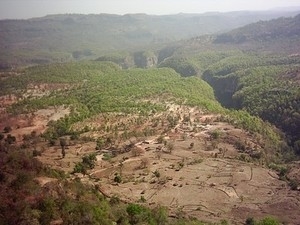 |
| View of Patalkot from the top |
The Patalkot Forest was so well hidden that people on the outside didn't even know it existed. It is a very special place, rich with plants and animals. The natives who live there know how to collect and grow the plants they need for food, clothing and building their homes. They also have a special skill that has been passed down every generation. They know the secrets of the medicine plants. This may not seem important if you can buy medicine from a drug store, but scientists know that most medicines come from the plant world and discovering new medicines is always exciting and important. Imagine what the world was like before scientists discovered that a mold growing in the soil could kill powerful bacteria. That was the miracle of Penicillin. Another disease, leukemia, killed millions of children until scientists discovered a tiny pink flower in Madagascar that was the cure. Some scientists believe that the cure for many human diseases lies in finding the right plants in wild places. That is why a new science has developed called "ethnobotany". This science studies native people living in the forest to discover what healing knowledge they have and which plants they use for medicines. Many new medicines have been discovered this way and it has added a new reason to protect our disappearing rain forests. They may hide the cures for many diseases for which we still need cures!
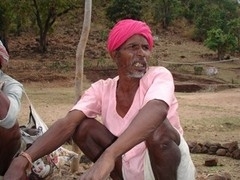 |
| Bharia of Patalkot valley (pic given by Dr. Acharya) |
Deepak Acharya, who grew up near the Patalkot Forest, had always looked down into the valley with curiosity and wonder. He had heard stories about mysterious natives and wild animals living there. One day he worked up the courage to visit the Patalkot Forest and asked a local man who knew the forest people to guide him. They made the long hike down into the valley. The trees were so thick it was hard to walk and all around them they could hear the sounds of wild birds and animals. Deepak was frightened and tired by the time they entered a village set deep in the jungle. A man greeted them and spoke to the guide inviting them into one of the grass huts. Looking closely at Deepak, the native man became concerned. He could see that Deepak was exhausted. He left them and returned with twig and told Deepak to chew on it. Deepak noticed the twig had a sweet flavor. Then the native gave him some juice that was squeezed from a local plant. Within moments Deepak felt energized and refreshed. He tried to ask the native about the plant, but he only smiled and nodded. From that moment, Deepak knew he wanted to study the Patalkot Forest.
He went to college to study botany (plants) and then received a Ph.D. in microbiology followed by Post Doctorate in Ethnobotany. For more than 17 years now, Dr. Deepak Acharya has been studying Patalkot, its people, and their knowledge of medicinal plants. He has discovered many things about them. More than 2,000 natives live in villages scattered throughout the forest. There is a great harmony among them living in a comfortable balance, gladly helping each other, growing and collecting their own food foods. They are unusually skilled at making pulps and extracts of plants for curing illnesses. They have medicinal treatments for many illnesses including; measles, cholera, hypertension, diabetes, coughs, snakebites, and even pain.
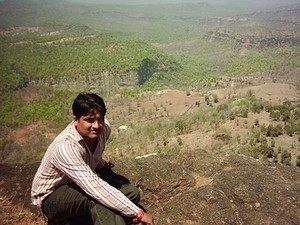 |
| Dr. Deepak Acharya near Patalkot Valley |
"Patalkot was becoming famous for its treasure of medicinal plants. With the discovery of Patalkot's treasures, though, some other things began to happen. The natives are generous with their knowledge and offer their medicinal secrets with open hearts. This is how their people have always survived, by sharing information and supplies with each other. People who came to the forest, however, saw a way to profit from this. They brought in teams of harvesters to strip the forest clean of valuable herbs. They sold them on the outside for great profit. Whole sections of forest were cut to gain easier access to collection sites. In trade they gave the people portable radios that blared through the forest, frightening off wildlife and quickly replacing the communal music that bound the tribes together."
Then loggers began cutting down the trees. Deepak Acharya and other friends of Patalkot were distressed to see these things happening and acted quickly to protect the forest and its people. New laws have been passed to stop logging and plant collection. Conservation officers now keep watch and, with the help of volunteers and Dr. Acharya, it is hoped that Patalkot can be protected from the pressures of the modern world. It is wonderful to discover a place full of natural treasures, but we must always protect a place we love even if it means limiting how much we can enjoy it, so it can stay in its natural state.
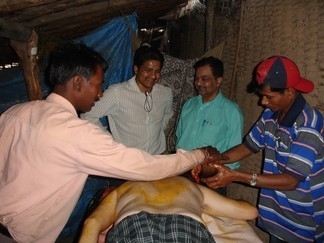 |
| Dr. Deepak Acharya with Dr. Nanda in Dangs (By Dr Acharya) |
Born on April 30th, 1975, in Katangi Village of District Balaghat in Madhya Pradesh, Dr. Acharya took his primary education in the same district. He then came to Chhindwara and completed school. He did his doctorate work at Sagar University and, currently, he is Director (R & D) at Abhumka Herbal Pvt Ltd based in Ahmedabad (Gujarat).. Dr. Acharya’s contribution to Patalkot and its people is certainly marvelous and can’t really be defined in a little story like this. Dr. Acharya is a modern-day herb hunter whose excavation is the knowledge held by the tribes' aging local mystic healers, known as Bhumkas in Patalkot. Dr. Acharya and other researchers around the world are racing to explore and document ancient remedies before the practitioners die out. Dr. Acharya "has put together the first written survey of the area's plants and what the bhumkas use the herbs for; the tribesmen, most of whom are illiterate, are accustomed to verbally passing knowledge from generation to generation." Voigt.
Dr. Acharya’s herbal formulation company will collect and study the efficacy of tribal remedies. According to Dr. Acharya, medicinal plants and indigenous knowledge for the Indian economy could become what oil is to the Gulf. "We aim to document indigenous knowledge, then test it in the laboratory," says Dr. Acharya. "We hope to produce drugs that are easy to access, low-cost, and protect the intellectual property rights of the tribes." His company plans to donate a third of its profits from any drugs developed to the tribal communities from which they come.
"For six-and-a-half years, Dr. Acharya traveled four hours across the bumpy 80-kilometer road between Patalkot and his hometown, Chhindwara, where he studied and taught botany and microbiology at Danielson College, a small college. He learned the local language to build trust among the xenophobic medicine men, and hiked up and down steep, rocky ravines of the 79-square-kilometer valley to catalog more than 500 medicinal plants and more than 200 tribal treatments. He is drawn by the challenge of trying to substantiate whether any of the herbs stand up to tribal claims that they can effectively treat hundreds of disorders." Voigt
Dr. Acharya has extended his work area now from Patalkot to Dangs in Gujarat. “It’s an amazing task to document indigenous tribesmen in Dangs,” says Dr. Acharya. Dang District is quite isolated and materially underdeveloped, encompassing 1800 Km2 in a rugged valley noted for its still largely pristine teak forests. Dangs is 100% tribal district declared by the Economic Times, and also it is the most backward district among top 20 in India mentioned in the Planning Commission bulletin recently. The Bhagat (priest and medicine man) is thought to be the ultimate "good man." He is believed to be a spiritual man who communicates with the gods. He is considered a friend, a philosopher, a guide, and a healer. Dang is known to have hundreds of rare and important medicinal plants. Bhagat perform traditional healings. Tribals of this region are fully dependent upon herbal medication. They have cures for almost all common disorders and a few of them claim to cure severe health disorders like cancer, too. The most important thing to note is: “They feel insecure when an outsider comes and meets them.” They have been cheated, looted and deceived a lot. People came, took knowledge, uprooted plants and forgot the tribals.
Dr. SK Nanda, Additional Chief Secretary in Government of Gujarat State has spent many years in Dang. Thanks go to Dr. Nanda who extended his full support to Dr. Acharya. According to Dr. Acharya, “Dr. Nanda's support and belief in our mission has been tremendous. It took 2 years to convey my mission to the people in Patalkot.” “Unlike Patalkot, Dang has been easy to access and the full credit goes to Dr. Nanda.” Dr. Acharya's company, Abhumka Herbal, is deeply engrossed in formulizing the traditional herbal knowledge into finished products now. Interestingly, the company felicitates age-old herbal knowledge holders and is determined to safeguard their financial and intellectual propety rights. Now, tribals of both regions, i.e., Patalkot and Dangs, are noticing Dr. Deepak Acharya’s mission of “recognition of their knowledge.” Many products based on indigenous knowledge are being sold by them through their online marketing channel at the company's website.
Page created on 11/6/2014 9:12:47 AM
Last edited 1/9/2017 9:51:22 PM
